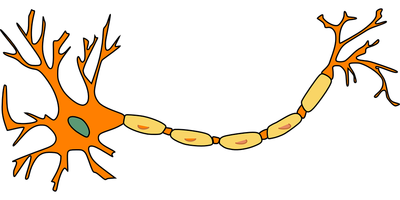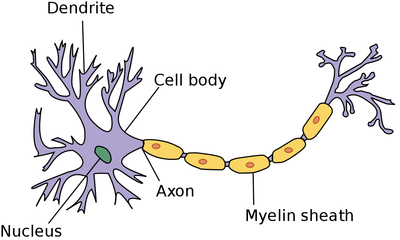Neuron
Contents
Key Stage 3
Meaning
A nerve cell is a specialised cell in animals which transmits electrical impulses around the body.
Adaptations of Nerve Cells
- Nerve Cells have an elongated shape to send electrical impulses more quickly.
- Nerve Cells have branches called dendrites to link up to other nerve cells.
About Nerve Cells
- All nerves in the body are made of nerve cells.
- Nerve cells are specially adapted to send electrical signals quickly.
- Many nerve cells grouped together make nerve tissue.
Key Stage 4
Meaning
Neurons are specialised cells in the nervous system which transmits electrical impulses around the body.
Adaptations of Neurons
- Neurons have an elongated axon to send electrical impulses more quickly.
- Neurons have branches called dendrites to link up to other neurons.
- The axon of a neuron is covered in a myelin sheath which acts as an electrical insulator to maintain the strength of the impulse as it passes along the axon.
| A diagram of a motor neuron. |
About Neurons
- Neurons join together to form nerves.
- The point where two neurons meet is called a synapse.
- At the synapse between two neurons the electrical impulse must be transmited across the gap.
There are three different types of neuron you should know:
References
AQA
- Nerve cells, page 14, GCSE Biology; The Revision Guide, CGP, AQA
- Nerve cells, page 14, GCSE Combined Science; The Revision Guide, CGP, AQA
- Nerve cells, page 31, GCSE Biology, CGP, AQA
- Nerve cells, page 31, GCSE Combined Science Trilogy; Biology, CGP, AQA
- Nerve cells, page 9, GCSE Combined Science Trilogy 1, Hodder, AQA
- Nerve cells, pages 8, 9, GCSE Biology, Hodder, AQA

